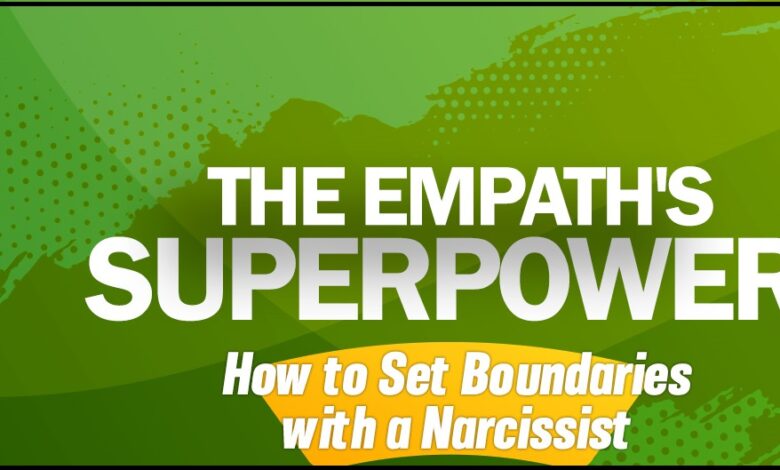The Empath’s Guide to Surviving a Narcissist

Introduction
When it comes to interpersonal relationships, few dynamics are as complex and challenging as the one between an empath and a narcissist. Understanding these roles is the first step toward navigating this tumultuous terrain.
What is an Empath?
An empath is someone highly sensitive to the emotions and energy of others. They possess an extraordinary ability to sense and absorb the feelings of those around them, often to the point of experiencing these emotions as if they were their own.
What is a Narcissist?
A narcissist, on the other hand, is characterized by a inflated sense of self-importance, an deep need for admiration, and a lack of empathy for others. They often engage in manipulative behaviours to control and dominate those around them.
The Dynamics of an Empath-Narcissist Relationship
The relationship between an empath and a narcissist can be particularly toxic. The empath’s natural inclination to help and heal often makes them the perfect target for the narcissist’s manipulative tendencies. This dynamic can lead to an emotionally draining and damaging cycle that is difficult to break.
Signs of Being in a Relationship with a Narcissist
Recognizing that you are in a relationship with a narcissist is crucial for your well-being. Here are some common behaviours to look out for:
Common Behaviors of Narcissists
- Grandiosity: An exaggerated sense of self-importance and entitlement.
- Lack of Empathy: Inability to understand or care about the feelings of others.
- Manipulation: Using deceit, guilt, or charm to control others.
- Gaslighting: Making you doubt your memories and perceptions.
- Love Bombing: Overwhelming you with affection and attention to gain control.
Examples of Emotional Abuse and Manipulation Tactics
- Isolation: Cutting you off from friends and family to increase dependency.
- Blame Shifting: Never take responsibility for their actions and blame you instead.
- Triangulation: Bringing a third party into conflicts to create jealousy and competition.
The Impact on an Empath
The emotional and mental toll of being in a friendship with a narcissist can be devastating for an empath.
Emotional and Mental Health Effects
- Chronic Anxiety: Constantly walking on eggshells, fearful of triggering the narcissist’s wrath.
- Low Self-Esteem: Feeling worthless due to constant criticism and blame.
- Depression: Experiencing a pervasive sense of hopelessness and sadness.
Real-Life Stories
Consider Emma, an empath who was in a relationship with a narcissistic partner for five years. She describes how her once vibrant personality was eroded by constant emotional manipulation and gaslighting. Emma’s story is a poignant reminder of the profound impact such relationships can have on one’s mental health.
Strategies for Survival
If you find yourself in a relationship with a narcissist, there are strategies you can employ to protect yourself.
Practical Advice for Setting Boundaries
- Identify Your Limits: Clearly define what behaviours are unacceptable.
- Communicate Clearly: Be assertive about your boundaries without being confrontational.
- Consistency is Key: Enforce your boundaries consistently to prevent manipulation.
Self-Care Practices and Seeking Support
- Self-Care Practices: Engage in activities as nourish your mind, body, and soul, such that meditation, exercise, and creative hobbies.
- Seek Support: Talk to trusted friends, join support groups for empaths, or seek professional counselling.
Healing and Moving Forward
Surviving a relationship with a narcissist is just the beginning. The journey to healing and reclaiming your life is equally important.
Steps to Rebuild Self-Esteem and Trust
- Self-Reflection: Take time to understand your strengths and values.
- Positive Affirmations: Use affirmations to rebuild self-confidence.
- Trust-Building Exercises: Engage in activities that help you regain trust in yourself and others.
Resources for Professional Help and Support Groups
- Therapists Specializing in Narcissistic Abuse: Professionals who understand the unique challenges of these relationships.
- Support Groups: Organizations like the Narcissistic Abuse Recovery Program (NARP) offer community resources for survivors.
Conclusion
Navigating a relationship with a narcissist is incredibly challenging, but with the right strategies and support, you can survive and thrive. Remember that you are not alone; many empaths have successfully reclaimed their lives from the clutches of narcissistic partners.
Recap of Key Points
- Understand the dynamics between empaths and narcissists.
- Recognize signs of narcissistic behaviour and emotional abuse.
- Implement survival strategies and prioritize self-care.
- Seek professional help and support for healing and moving forward.
If you have your own stories or tips on surviving a relationship with a narcissist, we encourage you to share them in the comments below. Your experiences could provide invaluable support to others on their journey to recovery.
—
By targeting the keyword “the empath’s guide to surviving a narcissist,” this blog post aims to provide valuable insights and practical advice for empaths, survivors, and mental health advocates. Share this guide with your network to help others navigate and overcome the challenges of these complex relationships.
